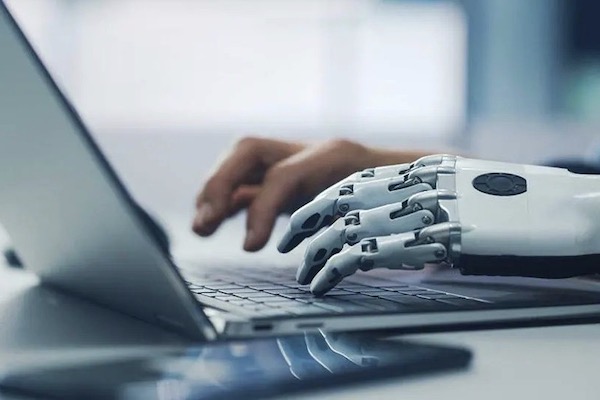Published on the 23/05/2023 | Written by Heather Wright

As workers concede they’re keen to delegate to AI…
Information overwhelm is costing local businesses on the innovation front and both workers and business leaders are now looking to AI to lift some of the burden – despite ongoing concerns that AI will steal jobs.
The annual Microsoft Work Trend Index surveys 31,000 people across 31 countries as well as calling on ‘trillions of aggregated productivity signals in Microsoft 365’ and labour market trends from LinkedIn’s Economic Graph.
In line with the global findings, the Australian and New Zealand results paint a picture of a world where work is outpacing our ability to keep up, impacting innovation and strategic thinking. And with the current buzz around AI thanks largely to ChatGPT and generative AI, that seems to be translating into increased acceptance – and desirability – of AI.
“AI won’t ‘fix’ work, it will create a whole new way of working.”
In Australia, 31 percent of managers expect AI to help increase productivity, with 29 percent expecting AI to help employees with repetitive/mundane tasks and 26 percent saying increased employee wellbeing is among the top benefits for AI.
New Zealand managers too, are eyeing up productivity boosts, with Kiwi business leaders 1.6x more likely to say AI will provide value in the workplace by boosting productivity, rather than cutting headcount.
But while most business leaders are talking up AI for productivity boosts, rather than cutting headcount, the report does show cuts are on cards at some Australian companies with 14 percent expecting AI tools to enable them to reduce headcount.
Companies are also clear that new hires will need skills to match the growth of AI in the workplace: 85 percent of Australian business leaders say new hires will need those skills to be prepared for the growth of AI – slightly ahead of the global average of 82 percent, and well ahead of New Zealand’s 76 percent.
It’s a pressure employees are also feeling, with 56 percent of Australians saying they don’t have the right capabilities currently to get their work done and need to be educated with the core competencies in AI.
What’s helping drive that AI demand is in part the issue of digital overwhelm – or in Microsoft parlance, digital debt: The inflow of data, emails, meetings and notifications that swamp employees on a daily basis.
The report suggests workers are spending too much time looking for information, communicating and coordinating, rather than innovating and working with others. And business leaders agree, with 60 percent of Australian leaders and 68 percent of Kiwi leaders saying they’re concerned about a lack of innovation or breakthrough ideas by their teams, as workers struggle to ‘get out of the red’ and find time to focus on creation, rather than simply responding to communications and searching for information.
Microsoft’s 365 analysis shows the average employee spends a whopping 57 percent of their time communicating – in meetings, email and chat – and 43 percent of their time on ‘creation’ activities in documents, spreadsheets and presentations.
For around 57 percent of A/NZ workers that’s translating into a struggle finding time and energy to get their work done, with those Australian workers 3.4 times more likely to say they struggle with innovation, while Kiwis are 2.6 times more likely to admit to the innovation struggle.
In the midst of that, AI appears to be a more palatable option for many, though it remains an uneasy relationship. While two in three Australians, and three in four Kiwis, saying they’re comfortable using AI to support their role, around 46 percent of workers across A/NZ expressed concern about AI replacing their jobs.
The lure of lessening workloads, is however, proving attractive for many, with 64 percent of Australians and 62 percent of Kiwis saying they would delegate as much work to AI as possible.
Globally, three in four people would be comfortable using AI not just for administrative tasks, but for analytical work, and even creative aspects of their role – figures mirrored in the Australian results.
As to the question of training, the Work Trend Index notes a whole new way of working will be required when AI becomes a ‘copilot’ (yes, this is a Microsoft report, and the company is, afterall, tying the release of the report to the launch of its Microsoft 365 Copilot Early Access Program for 600 global customers).
“Skills like critical thinking and analytical judgement, complex problem solving and creativity and originality are new core competencies, and not just for technical roles or AI experts,” the report notes.
Leaders surveyed said it is essential employees learn when to leverage AI, how to write great prompts, how to evaluate creative work and how to check for bias.
Topping the skills list according to leaders were analytical judgement, flexibility and emotional intelligence.
Satya Nadella, Microsoft chairman and CEO, says there’s an enormous opportunity for AI-powered tools to help alleviate digital debt, build AI aptitude and empower employees.
But the Microsoft report also notes that AI won’t simply ‘fix’ work. Instead, Microsoft says, it will ‘create a whole new way of working’.
“Leaders will need to help employees learn to work responsibly alongside AI to reap the rewards of the AI-employee alliance,” the report says.
And those rewards, according to Microsoft are more value creation for businesses and ‘a brighter, more fulfilling future of work for everyone’.



























